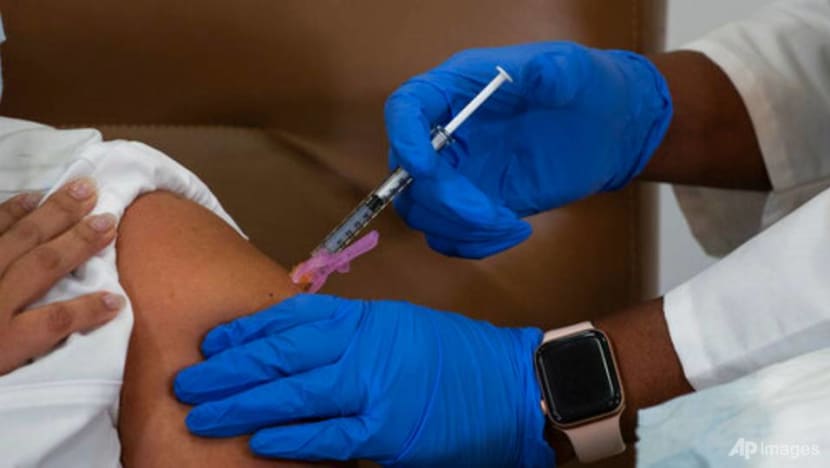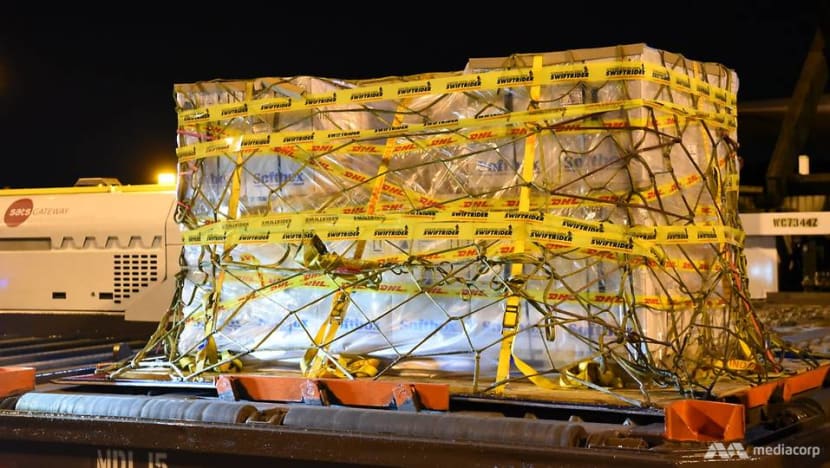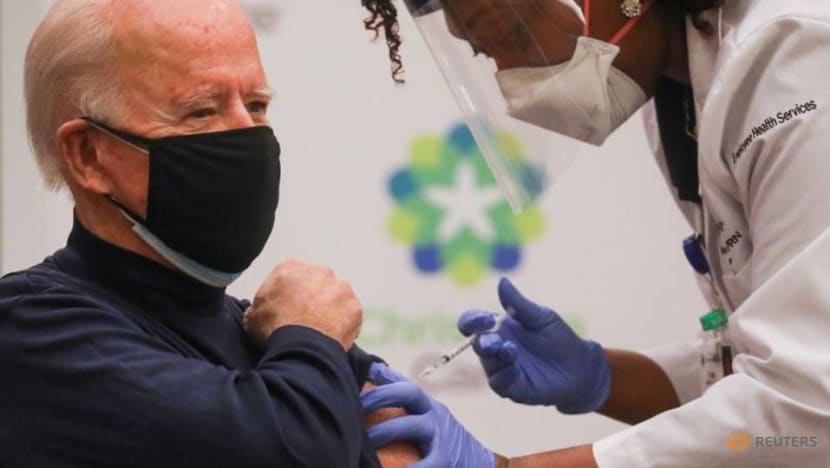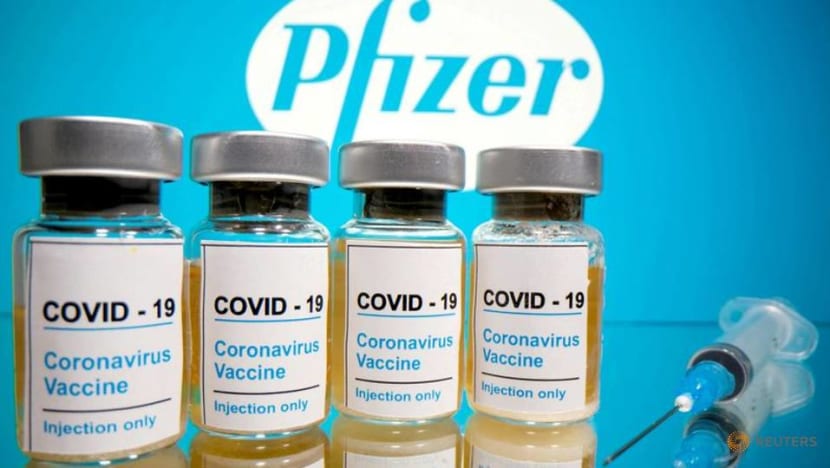commentary Commentary
Commentary: Here’s why taking the vaccine is necessary even if it’s optional
Singapore has addressed local transmission, but we must recognise that this success is transient and constantly at risk, says NUS’ Dr Alex Cook.

Arlene Ramirez, director of patient care at Long Island Jewish Valley Stream hospital, receives the Moderna COVID-19 vaccine in Valley Stream on Dec. 21, 2020. (Photo: Eduardo Munoz/Pool via AP)
SINGAPORE: At the beginning of the COVID-19 pandemic, several countries, such as the UK, pursued a “natural herd immunity” strategy.
Under this strategy, transmission would be slowed, but not prevented, until enough people had been infected that those who had not been infected yet would be protected by those who had recovered.
The idea was that COVID-19 could not be stopped, and it would be better to let the young be infected while protecting the elderly.
The strategy of herd immunity through natural infection became quickly discredited, as hospitals began to overflow in Lombardy and New York, and it became apparent that too many deaths would occur if no efforts were made to check the spread of the virus.
Despite this volte-face, the herd immunity proponents were in one sense correct. There are only really two exit states from the pandemic: Herd immunity, or global eradication. Since the first cases started to be identified in Europe and America, the latter has never looked plausible.
In Singapore, we have addressed local transmission, but only at great social cost. However, we must recognise that this success is transient and constantly at risk.
It is infeasible for Singapore to keep transmission in check locally while waiting for the rest of the world to get their outbreaks under control.
READ: Commentary: US on a cusp of a COVID-19 vicious cycle
Fortunately, herd immunity can (probably) be attained through a different route than through natural infection.
On Dec 14, Prime Minister Lee Hsien Loong announced Singapore has secured vaccines that are likely to be the pathway by which we can get to herd immunity without all the death and disease of the “natural herd immunity” strategy.
The first batch of COVID-19 vaccine developed by Pfizer and BioNTech arrived in Singapore on Monday (Dec 21) evening, making it the first recipient country in Asia.
ARE THE VACCINES SAFE?
However, the vaccines that Singapore has purchase options on — including those developed by Moderna and Sinovac — have been developed at historically unprecedented speed.

Typically, vaccine development takes a decade or longer. It is thus natural to doubt: Are they safe? Have corners been cut?
In fact, the development process has been similar to other vaccines, except that everything has been done much more efficiently.
Stages that normally would be done in sequence have instead been run in parallel where possible; interim information has been channelled to regulators; regulators have worked overtime to review the data; there are volunteers aplenty; and of course, there are so many infections that it has not taken long to demonstrate protection.
The money that has been poured into the large number of vaccines in development has also contributed substantially to getting vaccines onto the market so soon.
The global front runners — Moderna and Pfizer-BioNTech — have been tested in tens of thousands of trial participants. The trials show no major side effects so far. With this size, we can’t yet say whether extremely rare side effects are possible. Doing so will require hundreds of thousands of vaccinations.
READ: Commentary: Can Singapore be a major COVID-19 vaccine transshipment hub and save its aviation industry?
We also don’t know yet if infection is prevented or just disease, as the trials look for disease among the participants. It is in principle possible that people who are vaccinated could still be infected by SARS-CoV-2, the virus, but be protected from developing COVID-19, the disease.
What we can say right now, though, is that these forerunners are really good at preventing COVID-19, the disease. Data from the Moderna trial show clearly how almost no participant on the vaccine became unwell after the first few weeks.
HOW THE VACCINATION WILL PROTECT SINGAPORE AND ALL ITS PEOPLE
Assuming that further studies do confirm that the vaccines prevent infection as well as disease, then these vaccines will be what get us to the herd immunity exit from the pandemic. Vaccination, if it prevents infection, provides three forms of protection.

First, it protects the individual who has been vaccinated. The trials show that in the short term, getting vaccine stops you getting COVID-19. Even if infection is not prevented, we are confident about preventing illness.
Second, it protects the people whom the person being vaccinated comes into contact with. This is particularly salient as some people can’t get vaccinated yet.
The trials don’t include children, or pregnant women, for instance, and so neither of these groups can get vaccinated for now. Both groups can, however, be partially sheltered by their families or partners being vaccinated.
READ: Commentary: Sweden and Japan are paying the price for thinking they had COVID-19 exceptionalism
In my household, my children can’t be vaccinated but my wife and I can, and that should reduce the risk of our children getting infected through us.
Third, it protects society. Once enough people have been vaccinated, those who have not been vaccinated are sheltered by those who have. At that point, although infection can be introduced by a traveller or through someone who hasn’t been vaccinated, sustained transmission is no longer possible.
Assuming the vaccines do indeed prevent infection, the herd will protect itself, but only once enough people — likely between 70 per cent to 80 per cent — have actually been vaccinated.
It will take some time to vaccinate the greater part of 5.7 million people. Some groups will be prioritised, such as healthcare workers, others on the frontline, those living or working in dormitories, and the elderly.
IT IS IMPORTANT NOT TO DELAY GETTING A SHOT
But once everyone else’s turn comes, it is important not to procrastinate. There are two main reasons why.
The first reason not to tarry is the fragility of control.
Although the risk of getting COVID-19 in Singapore today is really low, there are numerous case studies of countries or regions where successful control was rapidly replaced by an outbreak flare up. Hong Kong, Japan and Korea come to mind.

Practically, we can’t wait until an outbreak suddenly takes off in Singapore and then rush for a vaccine. There are simply too many people to get vaccinated and the weeks it takes for the vaccine to take effect would mean that protection might not be fast enough to avoid a damaging outbreak.
READ: Commentary: China’s COVID-19 vaccines have gone from lab to public at breakneck speed. Are they safe and effective?
READ: Commentary: Should COVID-19 doses be split to cover more people?
Instead, it is important to take advantage of the low transmission rate we enjoy now, and hopefully will continue to enjoy in the early months of 2021, to get immunity up. Waiting until the need is pressing will mean waiting until it is too late.
There is a second, equally important reason to avoid procrastination on vaccination: Getting to herd immunity will be a game changer for Singapore and her people.
Once vaccine-induced herd immunity is reached, other forms of social protection will no longer be needed. The herd will protect itself, and the government will be able to relax social restrictions.
Businesses that have been badly affected can get back onto their feet. School children can play like they used to.
We can keep the good things from our grand social experiment of the last year, and drop the rest. The lost year will be over.
But before we can enjoy these re-found freedoms, we need to reach herd immunity. Enough people need to stand up and be vaccinated to get that protection from the herd.
If everyone waits for everyone else to get vaccinated, we’ll be in phase 3 forever.
As soon as my turn comes, I’ll be in the queue to get my shot, to contribute that one extra person to Singapore’s herd immunity threshold.
Listen to infectious disease expert outline what's needed to get a vaccine manufactured, transported and administered in our Heart of the Matter podcast:
BOOKMARK THIS: Our comprehensive coverage of the coronavirus outbreak and its developments
Download our app or subscribe to our Telegram channel for the latest updates on the coronavirus outbreak: https://cna.asia/telegram
Dr Alex Cook is Vice Dean of Research at the Saw Swee Hock School of Public Health, National University of Singapore.














